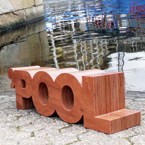This post comes to you from Cultura21
 Open Interdisciplinary Seminar series “Scientific Environmentâ€, 6th meeting of the 2013 spring session
Open Interdisciplinary Seminar series “Scientific Environmentâ€, 6th meeting of the 2013 spring session
 May 14th 2013, Faculty of Sociology, St. Petersburg State University (Russia), ul. Smolnogo 1/3, entrance 9, room 229, 18:00
Speakers:
-  Sacha Kagan (Leuphana University Lueneburg, and Cultura21): “Creative cities and the challenge of sustainabilityâ€
- Nikita Basov and Anisya Khokhlova (St. Petersburg State University, Faculty of sociology): “Communication Practices of Knowledge Generation: Comparing Creative Communities in St. Petersburgâ€
- Anna Zhelnina (Higher School of Economics at St. Petersburg, St. Petersburg State University, Faculty of Liberal Arts and Sciences) and Alexandra Nenko (Higher School of Economics at St. Petersburg): “Self-Organizing Urban Initiatives: Actors and Practices of Creative Transformation of the Cityâ€
This event is organized by the Center for German and European Studies (a collaboration between the St. Petersburg State University in Russia and the University of Bielefeld in Germany).
Website (with abstracts): click here
Cultura21 is a transversal, translocal network, constituted of an international level grounded in several Cultura21 organizations around the world.
Cultura21′s international network, launched in April 2007, offers the online and offline platform for exchanges and mutual learning among its members.
The activities of Cultura21 at the international level are coordinated by a team representing the different Cultura21 organizations worldwide, and currently constituted of:
– Sacha Kagan (based in Lüneburg, Germany) and Rana Öztürk (based in Berlin, Germany)
– Oleg Koefoed and Kajsa Paludan (both based in Copenhagen, Denmark)
– Hans Dieleman (based in Mexico-City, Mexico)
– Francesca Cozzolino and David Knaute (both based in Paris, France)Cultura21 is not only an informal network. Its strength and vitality relies upon the activities of several organizations around the world which are sharing the vision and mission of Cultura21
Powered by WPeMatico



